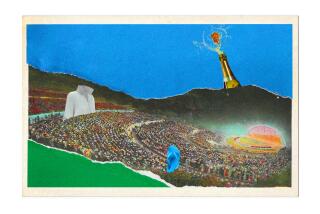DUETTING DIVAS : THE GRACE & SHIRLEY SHOW AT THE BOWL
- Share via
Until Jan. 31, 1982, one wouldn’t have expected to find Grace Bumbry and Shirley Verrett sharing the same stage.
They were too much alike--both glamorous singing actresses; both former mezzo-sopranos who, by dint of wishful thinking and dauntless artistic endeavor, had become reasonable facsimiles of dramatic sopranos; both contenders for triumph in the same territory. Rumor had it that they didn’t even like each other.
Then, in one of the better-hyped events of the era, Bumbry and Verrett embraced amid a cloud of sisterly gush for a Carnegie Hall concert in tribute to their illustrious forebear Marian Anderson. At the time it hardly seemed worth remembering that Anderson had been content to remain a mezzo-soprano throughout her pioneering career.
The following year, the amazing Grace & Shirley Show moved to Covent Garden, where television recorded it for a presumably grateful posterity. Tuesday, the duetting divas moved their act to Hollywood Bowl.
It was one of those
ng-you-can-sing-I-can-sing-better--or-louder-or-softer-or-higher-or-longer nights. But it was impeccably balanced and, if nothing else, polite.
Bumbry and Verrett were careful to share the dominant duties equally. When Verrett impersonated La Gioconda, Bumbry served as the relatively lowly Laura. But when Bumbry turned to the lofty Anna Bolena, it was Verrett’s turn to play seconda donna, as Giovanna Seymour.
And so it went: Verrett assumed the top line as Aida, towering above Bumbry’s Amneris. Then Bumbry got the titular flights as Norma while Verrett assumed the temporarily humble stances of Adalgisa. Everything was relative.
In the first round of competitive arias, Verrett ventured the Verdian bravura of Lady Macbeth. Ergo, Bumbry followed with the Verdian bravura of “Ernani, involami.”
When the contest turned to piano-pianissimo lyricism, Bumbry whispered “Io son l’umile ancella” from “Adriana Lecouvreur.” Verrett countered with the sighs and whimpers of the Willow Song and “Ave Maria” from “Otello.”
While the ladies lingered backstage, gasping for breath or gargling lemons or doing whatever divas do between star turns, Imre Pallo (replacing Michelangelo Veltri) led the Los Angeles Philharmonic through three obligatory manifestations of program padding.
He led the orchestra blandly and efficiently. He accompanied the soloists less than idiomatically. Under the prevalent circus-oriented conditions, however, symphonic matters mattered little. The spotlight remained steadfastly focused on the would-be sorceresses from the irrational world of opera.
Unfortunately, the sorceresses didn’t sing particularly well, the amplification system transformed the Bowl into an alfresco echo chamber and the wonted helicopters once again droned an unwanted alto ostinato.
Bumbry’s gutsy mezzo-soprano has lost a lot of resonance and clarity on the rocky road to sopranodom. The tone now tends to to be tough and a bit unsteady throughout, and the pitch turns sharp under pressure.
Verrett’s luscious mezzo-soprano has lost a lot of luster in the same perilous process. The tone now tends toward the thin and the dull in the lower registers, and the pitch sags when strain sets in.
Bumbry smudged the coloratura of the “Ernani” showpiece and bumbled most climactic flourishes, but sustained a nice, poised, ascending legato in the “Adriana” reverie. Verrett, who commands better dramatic instincts, brought flashes of psychological insight to Lady Macbeth’s flamboyant letter scene but seemed happier in the hushed lyricism of Desdemona.
In the duets, the essential roughness of Bumbry and the fundamental smoothness of Verrett suggested an awkward timbral conflict. This vocal marriage was not made in heaven.
A throng that numbered 6,561 (a lot for an opera house, a little for the Bowl) mustered its most spontaneous applause for the new gowns donned by the divas after intermission. This may have been a problematic concert, but it was a terrific fashion show.
More to Read
The biggest entertainment stories
Get our big stories about Hollywood, film, television, music, arts, culture and more right in your inbox as soon as they publish.
You may occasionally receive promotional content from the Los Angeles Times.










